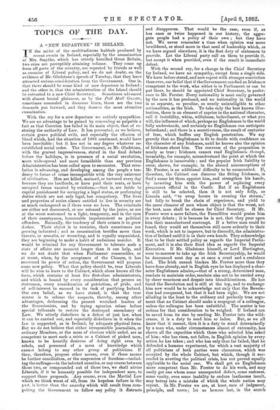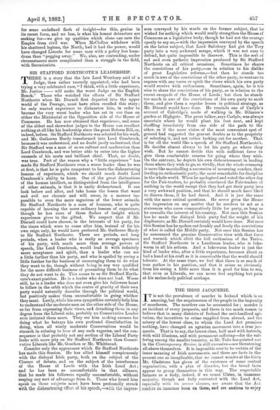TOPICS OF THE DAY.
A "NEW DEPARTURE" IN IRELAND.
TN the midst of the multitudinous hubbub produced by
recent events in Ireland, especially by the assassination of Mrs. Smythe, which has utterly horrified Great Britain, two cries are perceptibly attaining volume. They come up from all parts of the country, are repeated by friends as well as enemies of Liberal policy, and we do not doubt, on the evidence of Mr. Gladstone's speech of Tuesday, that they have attracted serious consideration from the Government. One is, that there should be some kind of new departure in Ireland ; and the other is, that the administration of the Island should he entrusted to a new Chief Secretary. Sometimes advanced with almost brutal plainness, as by the Pall Mall Gazette, sometimes concealed in decorous hints, those are the two demands put forward, and they deserve the most attentive examination.
With the cry for a new departure we entirely sympathise. We see no advantage to be gained by concealing so palpable a fact as that Coercion has failed in its main object, that of re- storing the authority of Law. It has prevented, as we believe, certain grave political evils, and especially the effusion of blood which, had the situation of 1881 continued, would have been inevitable ; but it has not in any degree whatever re- established social order. The Government, as Mr. Gladstone, with the gravest impressiveness, stated in the final debate before the holidays, is in presence of a social revolution, more wide-spread and more formidable than any previous Administration has been called upon to encounter. That revo- lution is advancing, and developing among the people a ten- dency to forms of crime incompatible with the very existence of civilisation. Men are killed, maimed, or tortured every day because they are landlords, or have paid their rents, or have occupied farms vacated by evictions,—that is, are liable to capital punishment for occupying a legal status, or performing duties which are not only legal, but compulsory. The lives and properties of entire classes entitled to live in security are as much endangered as if there were no laws. The criminals are either not discovered, or are released by the juries, or are at the worst sentenced to a light, temporary, and in the eyes of their countrymen, honourable imprisonment as political offenders. Naturally, the tendency of their crimes is to grow darker. Their object is to terrorise, their consciences are growing indurated ; and as assassination terrifies more than threats, or assaults, or wounding, and is equally unpunished, they are beginning to make a habit of audacious murder. It would be criminal for any Government to tolerate such a state of affairs one moment longer than it can help, and we do not doubt that when Parliament reassembles, or at worst, when, by the acceptance of the Closure, it has recovered its power of action, the Government will propose some new policy. What that policy should be, true Liberals will be wise to leave to the Cabinet, which alone knows all the facts, which contains at least five first-class administrators, and which is bound by every consideration that presses on statesmen, every consideration of patriotism, of pride, and of self-interest to succeed in its task of pacifying Ireland. Our own belief, as we have stated, is that the true course is to release the suspects, thereby, among other advantages, dethroning the present wretched leaders of the Secessionists, and by trying agrarian crime before special tribunals to restore the destroyed ascendancy of Law. We utterly disbelieve in a defeat of just law, when it can be carried out, and especially disbelieve in it when the law is supported, as in Ireland, by adequate physical force. But we do not believe that either irresponsible journalists, or ordinary Members, or the mass of electors while unled, are as +competent to meet such a crisis as a Cabinet of picked men, known to be heartily desirous of doing right even by rebels, and possessed of a mass of knowledge which cannot belong to any other group of politicians. If they, therefore, propose other means, even if those means be further conciliation, or the suspension of freedom—includ- ing the suffrage—in the infected counties, or any course between those two, or compounded out of those two, we shall advise Liberals, if it be humanly possible for independent men, to support those proposals. Any course, even the Martial Law which we think worst of all, from its hopeless failure in the past, is better than the anarchy which will result from com- pelling the Government to follow any policy it distrusts and disapproves. That would be the case, even if, as has once or twice happened in our history, the aggre- gate people had a policy of their own ; but they have not. We never remember a time when opinion was more bewildered, or stood more in that need of leadership which, as we have argued elsewhere, it is the first duty of statesmen to provide. Let the Liberal party call on them to provide it, but accept it when provided, even if the result is immediate defeat.
With the second cry, for a change in the Chief Secretary for Ireland, we have no sympathy, except from a single side. We have before stated, and now repeat with stronger conviction than ever, our belief that if the Government can find an Irishman competent to the work, who either is in Parliament or can be put there, he should be appointed Chief Secretary, in prefer- ence to Mr. Forster. Every nationality is most easily governed by the men it has produced, and no nationality in the world is so separate, so peculiar, so nearly unintelligible to other nationalities, as the Irish. To take only the best known illus- tration, there is an element of caprice in the national:character, call it instability, whim wilfulness, bedevilment, or what you will, the influence of which, perhaps no Englishman in the world fully understands and certainly no Englishman can anticipate beforehand; and there is a secretiveness, the result of centuries of fear, which baffles any English penetration. We say gravely that no Englishman is fit to decide with confidence on the character of any Irishman, until he knows also the opinion of Irishmen about him. The converse of the proposition is nearly as true ; Irishmen cannot read Englishmen through, invariably, for example, misunderstand the point at which the Englishman is immovable ; and the popular Irish liability to error, shown, for example, in the absurd misconceptions of Mr. Forster, is an additional difficulty to be surmounted. If, therefore, the Cabinet can discover the fitting Irishman, in God's name let them appoint him, and strengthen his hands, by investing him with the power of replacing every permanent official in the Castle. But if an Englishmen is still to be selected, then it is not only folly, as Lincoln said, "to swap horses in crossing the stream," but folly to break the chain of experience, and yield to the mere clamour of men whose object is that the worst, not the best, man shall be chosen for Chief Secretary. If Mr. Forster were a mere failure, the Parnellites would praise him in every debate ; it is because he is not, that they pour upon him their manufactured contempt. If a better man could be found, they would set themselves still more ardently to their work, which is not to improve, but to discredit, the administra- tion of Ireland until it is in their own hands. They acknowledge that to be their settled policy as regards the Imperial Parlia- ment, and it is also their fixed idea as regards the Imperial Executive. If Mr. Gladstone himself, or Lord Hartington, were to-morrow to take up the Irish Secretaryship, he would be denounced next day as at once a cruel and a credulous fool. The Irish cannot blacken Mr. Forster more than they have done already, and in English eyes he has displayed a char- acter Englishmen admire,—that of a strong, determined man, resolute to maintain order, resolute also not to be carried away by sheer weariness and despair into bloodthirstiness. He has faced the Revolution and is still at the top, and to exchange him now would be to acknowledge not only that the Revolu- tion had conquered, but that it had been right. We are not alluding in the least to the ordinary and perfectly true argu- ment that no Cabinet should make a scapegoat of a colleague, unless the colleague has been unfaithful. The matter is too serious for that consideration to be weighed. If Ireland can be saved from its sins by sending Mr. Forster into the wild- erness, it is a duty to send him so laden. But, as we all know that it cannot, then it is a duty to stand determinedly by a man who, under circumstances almost of extremity, has shown all the capacities which those who selected him asked of him ; who has risen, not fallen, in English opinion by every action he has taken ; and who has only thus far failed, that he defended a humane experiment, for which a vast majority of all politicians of both parties were clamorous, which was. accepted by the whole Cabinet, but which, though it suc- ceeded in averting the political crisis, has not proved equally applicable to the social one. We shall get no Englishman more competent than Mr. Forster to do his work, and may easily get one whom some unsuspected defect, some rashness, some vanity, even some inability to endure loathsome insult, may betray into a mistake of which the whole nation may repent. In Mr. Forster we are, at least, sure of judgment, principle, and nerve; let us beware lest, in the search
for some undefined flash of insight—for this, genius in its rarest form, and no less, is what his honest detractors are seeking for—we give up qualities which alone can save the Empire from civil war. When McClellan withdrew with his shattered legions, the North, had it had the power, would have changed Lincoln for some man with a policy less hum- drum than "pegging away." We, also, are contending, under circumstances more complicated than a struggle in the field, with Secessionists.



































 Previous page
Previous page